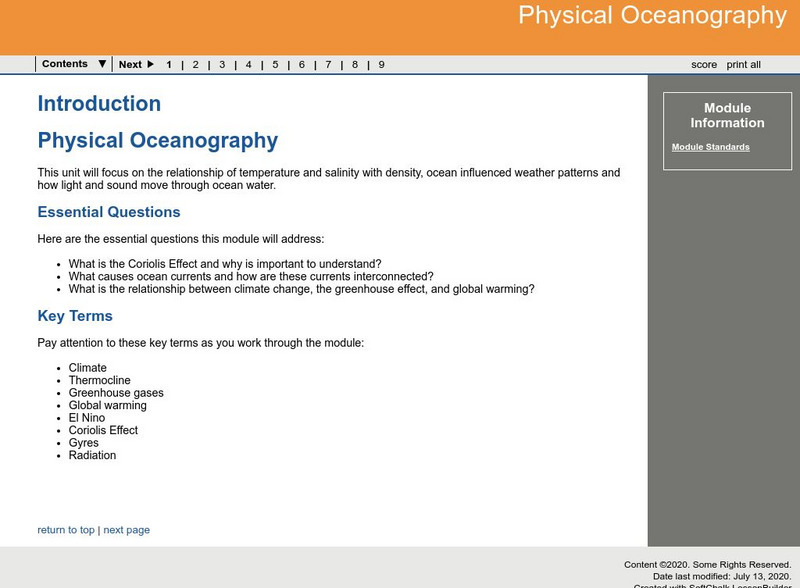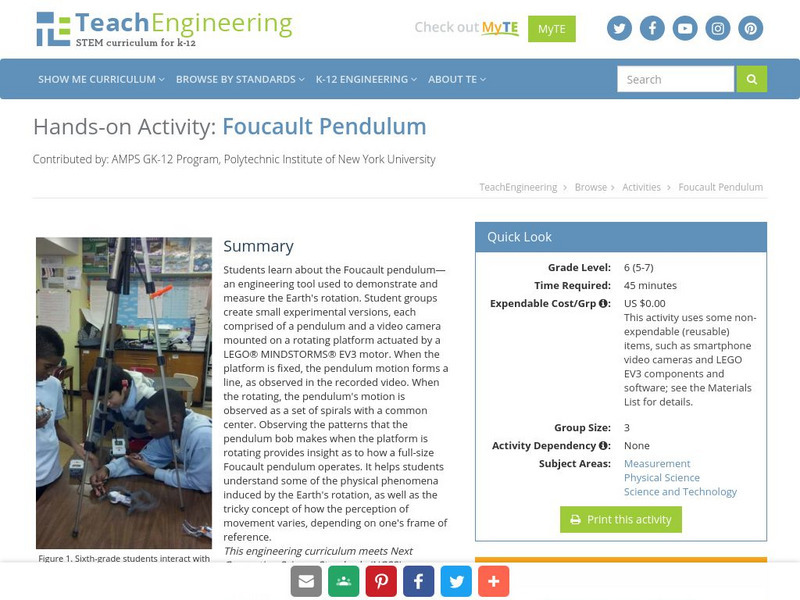Hi, what do you want to do?
Scholastic
Study Jams! Air Pressure & Wind
Blow your class away with a gust of humor as they watch this video about air pressure and wind. Along the way, they find that the density of air (as determined by temperature, altitude, and water vapor content) leads to air pressure...
Curated OER
Regents High School Examination: Physical Setting Earth Science 2008
Throughout this earth science exam, high-school geologists complete a series of multiple choice and short answer questions about the solar system, atmosphere, and earth system. This is an amazing test, as are all of the exams developed...
Curated OER
Motion in the Ocean
How does the formation of currents and waves in the ocean happen? High schoolers will learn about the primary causes for ocean currents and waves by calculating a wave's amplitude and nautical mile speed. Then they will complete a...
Scholastic
Study Jams! Waves & Currents
Ocean lovers hang ten as they watch this film about waves and currents. What causes waves? What is a current? Learn this and more from Sam as he explains why RJ was struggling to surf the gnarly waves. Have your class watch this at home...
Curated OER
Message in a Bottle - A Satellite Journey through the Gulf Stream
The Gulf Stream has historically provided humans with a faster trade route because of its swift-moving waters. It continues to be a source of information and fascination for oceanographers today. As your class views this collection of...
Curated OER
Upwelling in the World Ocean
Here is a fascinating topic: the upwelling of ocean waters. Oceanography pupils learn what mechanisms cause upwelling, types of upwelling, and the effects on marine life. Colorful satellite imagery and informative diagrams bring this...
Curated OER
Why Do We Have Weather?
Convection is offered as the reason behind our weather phenomena. This presentation assumes that viewers are familiar with the methods of heat transfer, and is therefore more geared toward middle-school meteorologists. The focus is on...
Curated OER
Winds
Fifth graders investigate how pressure differences create wind. They discuss the Coriolis effect, then explore what happens when blown-up balloons are released.
Curated OER
Ducks in the Flow: Resources about Surface Ocean Currants for the Upper Elementary Classroom
Students investigate surface ocean currents. For this oceanography lesson, students work in small groups to create models that demonstrate surface currents, the Coriolis Effect, and how surface currents move debris. This lesson includes...
Curated OER
Air Pressure and Wind
In this air pressure and wind worksheet, students answer fifteen questions about how air pressure is measured, what it is, the reasons for changes in air pressure and the weather as air pressure changes. They also answer questions about...
Curated OER
Environment: Wild Wind Direction
Students examine the different types of wind patterns. Using common materials, they construct weather vanes to measure and record wind direction over a two-week period. After analyzing the data, they draw conclusions about the...
Curated OER
RIDING THE WIND
Students locate the Trade Winds, Westerlies and Polar Easterlies on a map, explain the impact of the rotation of the Earth, and plot a route for a round trip voyage from New York to London.
Curated OER
Physical Science Word Search Puzzle
Use this word search to practice physical science vocabulary words. This word search allows you to determine the amount of columns and rows you would like to include; however, when you change the amount columns and rows, the word list...
Curated OER
Twisting the Air Away - The Coriolis Effect
Students examine the Coriolis Effect and its effects on the different hemispheres. In this Earth science lesson students divide into groups to they make predictions. Students then complete an activity to explore movement as...
Curated OER
As the World Turns: The Coriolis Effect: Global Wind Patterns, Earth's Rotation
Students use pencil and paper to explore the Coriolis effect and how the Earth's rotation causes global wind patterns.
Curated OER
Ocean Currents
In this currents worksheet, students review the Coriolis effect, surface currents, and density currents. This worksheet has 8 short answer questions.
Georgia Department of Education
Ga Virtual Learning: Physical Oceanography
A student learning module with a focus on the relationship of temperature and salinity with density, ocean-influenced weather patterns, and how light and sound move through ocean water.
Texas A&M University
Ocean World: Currents
Get some information about ocean currents on this site. Learn that currents can be driven either by the winds or mixing at deeper levels.
Georgia Department of Education
Ga Virtual Learning: Our Solar System
This interactive tutorial will take students on a tour of our solar system. Students begin near the Sun with the really hot planets of Mercury and Venus. They will learn about Mars, probably the first planet that humans will visit. Next...
Georgia Department of Education
Ga Virtual Learning: Weather and Climate
In this amazingly comprehensive interactive tutorial you will learn how factors such as ocean currents, topography, and air currents affect weather patterns. You will also learn the similarities and differences between weather and climate.
OpenStax
Open Stax: Fictitious Forces and Non Inertial Frames: The Coriolis Force
In the following interactive students will begin to discuss the inertial frame of reference and the non-inertial frame of reference. They will also describe the effects of the Coriolis force.
Texas Education Agency
Texas Gateway: The Sun and Convection Currents
Learn about the sun's energy, Coriolis effect, and how wind is formed in this interactive learning module.
Texas A&M University
Ocean World: Bringing the Ocean to the Classroom
Online resource for students and teachers to see information on icebergs, fisheries, coral reefs, waves, currents and more. Provides teachers with learning activities. Has its own ask-an-expert site (Ask Dr. Bob), and provides real-time...
TeachEngineering
Teach Engineering: Foucault Pendulum
Students learn about the Foucault pendulum, an engineering tool used to demonstrate and measure the Earth's rotation. Student groups then create small experimental versions, each comprised of a pendulum and a video camera mounted on a...




























